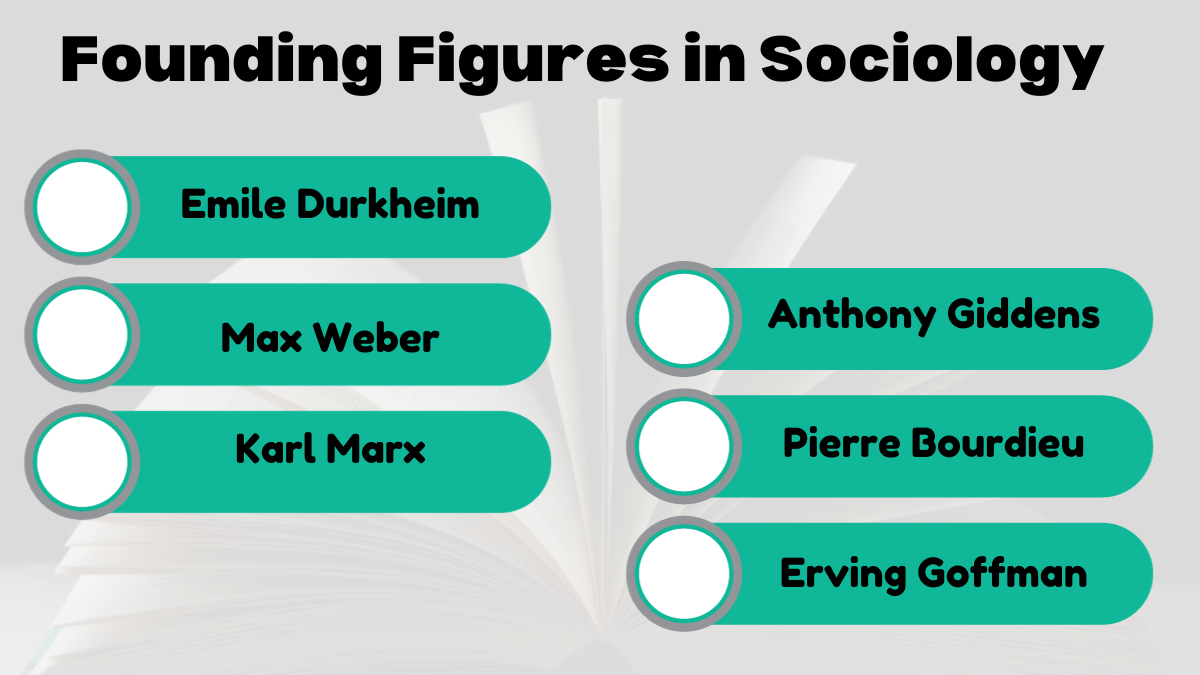
Founding Figures in Sociology
Founders of Sociology
Emile Durkheim: Known for his work on suicide and the theory of functionalism, Durkheim's influence in establishing sociology as a science cannot be overstated.
Max Weber: Weber's emphasis on understanding social action and the concept of the Protestant Ethic profoundly shaped sociological thought.
Karl Marx: A revolutionary thinker, Marx's analysis of class struggle and capitalism remains a cornerstone in sociological discourse.

Contemporary Sociologists
Anthony Giddens: Renowned for his theory of structuration, Giddens has made significant contributions to the understanding of modern society.
Pierre Bourdieu: His work on cultural capital and habitus has been instrumental in examining the role of culture in social inequality.
Erving Goffman: Goffman's dramaturgical approach explores how individuals present themselves in everyday life, adding a new dimension to sociological analysis.
Impact of Sociological Theories
Sociological theories developed by these pioneers continue to shape our understanding of social phenomena, offering valuable insights into the complexities of human interactions.
Role of Women in Sociology
Harriet Martineau: As one of the earliest female sociologists, Martineau's feminist perspective challenged societal norms and contributed significantly to sociology.
Dorothy E. Smith: Smith's feminist standpoint theory has been crucial in understanding how gender intersects with other social categories.
Global Perspectives in Sociology
Immanuel Wallerstein: Wallerstein's world-systems theory provides a framework for examining global inequality and the interconnectedness of nations.
Saskia Sassen: Renowned for her work on globalization, Sassen explores the impact of economic and social changes on urban environments.
Sociologists and Social Movements
C. Wright Mills: Mills' concept of the sociological imagination encourages individuals to connect personal troubles to larger societal issues.
Frances Fox Piven: Piven's work on social movements and political activism underscores the role of collective action in societal change.
Ethics in Sociology
Addressing ethical considerations in research and practice is paramount in sociology, ensuring the well-being and confidentiality of study participants.
Challenges and Criticisms in Sociology
While sociology offers valuable perspectives, it is not without challenges and criticisms. Debates surrounding objectivity, cultural bias, and the potential for reinforcing stereotypes require ongoing reflection.
Interdisciplinary Nature of Sociology
Sociology's intersection with other disciplines, such as psychology, economics, and anthropology, fosters a holistic understanding of human behavior and societal structures.
Sociology in Popular Culture
From books to films, sociology permeates popular culture, influencing the portrayal of social issues and shaping public perception.
Sociology's Influence on Public Policy
Sociological research plays a crucial role in informing public policy, addressing societal issues, and contributing to evidence-based decision-making.
Future of Sociology
As society evolves, so does sociology. The future promises new avenues of exploration, with emerging technologies and global challenges shaping the trajectory of the discipline.
Rich tapestry of sociology is woven with the threads of diverse thinkers who have illuminated the complexities of human society. Their legacies endure, shaping not only academic discourse but also influencing our understanding of the world.
Appreciate the creator